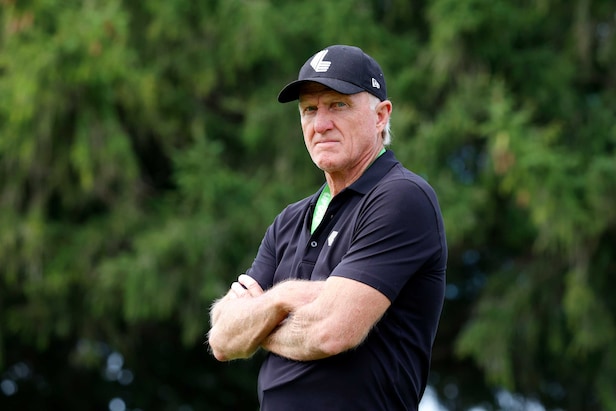The ultimate fate of LIV Golf—whether it lives on for years or withers on the vine—remains uncertain, but its impact on professional golf is undeniable. The league that began in 2022 with money from Saudi Arabia’s Public Investment Fund and poached a handful of the PGA Tour’s brightest stars with big-money contracts became a polarizing force while also forcing the established circuit to re-examine its own approach to players and fans.
The result is a dramatically different landscape, and one that will keep changing with new investment and leadership at the PGA Tour, which currently is showing little interest in a partnership with an entity that is hemorrhaging billions of dollars entering its fifth year.
Advertisement
Undeniable is that LIV likely would not have come into existence without the drive and desire of World Golf Hall of Famer Greg Norman, LIV Golf’s founding CEO, to finally see his career-long idea of a world tour come to fruition. What did he get out of it? A whole lot of personal and professional grief for partnering with a controversial country and its leadership, to go along with the satisfaction that he truly has changed the game in the long-term, even if he is no longer front and center in the process.
In January, Norman was replaced as LIV’s day-to-day leader by Scott O’Neill. He remained with the league until his contract expired in August. Since then, the 70-year-old has been focused on his golf design business and serving on the organizing committee for the 2032 Olympic Games that will be held in Brisbane.
Norman’s thoughts about his time with LIV Golf linger, of course, and he shared many of those extensively for the first time in an interview with Australian Golf Digest that was published in the magazine’s November 2025.
“I knew there were going to be a lot of headwinds. I didn’t anticipate the magnitude of those headwinds because … as time went by, those headwinds were created by misperceptions,” Norman said. “[But] once the Strategic Sports Group [SSG] came in [to partner with the PGA Tour], and once the other private equity money started rolling in, that was the catalyst for everybody to calm down a little bit, in my opinion. They started to see that what LIV did—bring private equity into the game of golf for the first time in 53 years—was a positive.”
Advertisement
Here are some excerpts from the interview:
On being “judged”
“I enjoyed my time at LIV. But I’ll be honest with you, it was hard. It was very draining on me. I was working 100-hour weeks. I’m not going to say all the abuse was anything [of consequence], but what hurt me the most was the lack of understanding of why people would judge me and give the abuse they did. That was the thing that bothered me the most, because I’m the type of guy who will happily sit down and talk about things. And if I’m wrong, I’ll admit I’m wrong. But don’t judge me. Don’t judge what LIV was truly all about.”
On LIV’s impact
Advertisement
“When you look back on the past 12 months, there’s been a realization that all those investment dollars have done great things for the institutions as well as the players, in all parts of the world. Even with the PGA Tour [boosting its prize money with elevated events], I was quietly happy when I saw that, because the players benefited from it.
“Are they going to recognize LIV for doing that? No, but I do know that was a significant uptick for them. For them to be able to play for more money, even play in less competitive fields – they reduced the size of the fields – I just said, ‘Well, there you go.’ The adoption, to some degree, of what we implemented has been accepted.”
On his relationship with LIV’s players
“There were certain players that really came up to me [upon his departure], and there were a few others that came up to me and just thanked me for what I did for them, for being the tip of the spear, for taking it all on. Phil [Mickelson] took [plenty of heat] too, but I took it on behalf of all the guys, so that to me was part of the job—I had to do it, right? And if you’re going to make meaningful change, running through a brick wall without getting bloody, that’s not going to happen.
Advertisement
“So, the guys did reach out to me—not all of them, no—but probably Phil was the one who really was very open about it and appreciative of what I did do. ‘Poults’ [Ian Poulter] was the same, along with ‘Westy’ [Lee Westwood].”
On learning from success and failures
“I’d do it again in a heartbeat. Like anything, you look back at losing a golf tournament and ask yourself, ‘Why did you lose that golf tournament? Did I hit a bad 5-iron? Or did I not concentrate?’ So, you sit back and you analyze it, and of course you would do that. And, like any CEO, you have to learn by your successes just as much as by your failures. So, yes, absolutely I’d do it again.”
Read the full article here



